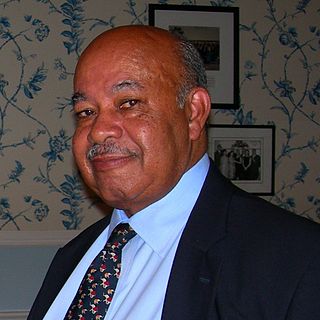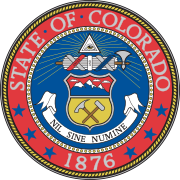
Kendrick Brett Meek is an American politician who was the U.S. Representative for Florida's 17th congressional district from 2003 to 2011. He was the Democratic nominee in the 2010 Senate election for the seat of Mel Martinez, but he and independent candidate Charlie Crist lost in a three-way race to Republican Marco Rubio.

Wardell Anthony "Ward" Connerly is an American political activist, businessman, and former University of California Regent (1993–2005). He is also the founder and the chairman of the American Civil Rights Institute, a national non-profit organization in opposition to racial and gender preferences. He is considered to be the man behind California's Proposition 209 prohibiting race- and gender-based preferences in state hiring, contracting and state university admissions, a program known as affirmative action.

In California, a ballot proposition can be a referendum or an initiative measure that is submitted to the electorate for a direct decision or direct vote. If passed, it can alter one or more of the articles of the Constitution of California, one or more of the 29 California Codes, or another law in the California Statutes by clarifying current or adding statute(s) or removing current statute(s).
In the politics of the United States, the process of initiatives and referendums allow citizens of many U.S. states to place new legislation on a popular ballot, or to place legislation that has recently been passed by a legislature on a ballot for a popular vote. Initiatives and referendums, along with recall elections and popular primary elections, are signature reforms of the Progressive Era; they are written into several state constitutions, particularly in the West.

The Michigan Civil Rights Initiative (MCRI), or Proposal 2, was a ballot initiative in the U.S. state of Michigan that passed into Michigan Constitutional law by a 58% to 42% margin on November 7, 2006, according to results officially certified by the Michigan Secretary of State. By Michigan law, the Proposal became law on December 22, 2006. MCRI was a citizen initiative aimed at stopping discrimination based on race, color, sex, or religion in admission to colleges, jobs, and other publicly funded institutions – effectively prohibiting affirmative action by public institutions based on those factors. The Proposal's constitutionality was challenged in federal court, but its constitutionality was ultimately upheld by the Supreme Court of the United States.

Arizona Proposition 107 was a proposed same-sex marriage ban, put before voters by ballot initiative in the 2006 General Election. If passed, it would have prohibited the state of Arizona from recognizing same-sex marriages or civil unions. The state already had a statute defining marriage as the union of a man and a woman and prohibiting the recognition of same-sex marriages performed elsewhere.
Amendment 44 was a proposed amendment to the state statutes submitted for referendum in the 2006 general elections in the U.S. state of Colorado. The amendment proposed the legalization of the possession of one ounce or less of marijuana for any person twenty-one years of age and over, as long as marijuana use does not occur in public. The measure was eventually defeated at the polls by 60-40 percent.

Amendment 38 was a measure on the 2006 ballot in Colorado. If passed, it would have amended the Colorado Constitution. It would have extend the petition process to all levels of state government to expand citizens' ability to propose changes to state laws and local ordinances or resolutions.

Leon Drolet is a Michigan Republican politician and elected Macomb County Commissioner. He is a political activist known for his libertarian views. From 2001 to 2006 Drolet served in the Michigan House of Representatives. Drolet also served as a Macomb County, Michigan county commissioner from 1999–2000 and from 2006–2008.

Douglas Edward Bruce is an American conservative activist, former legislator in the U.S. state of Colorado and convicted felon.

The State Income Tax Repeal, also known as Massachusetts Question 1, was one of the 2008 ballot measures that appeared on the November 4, 2008 ballot in the U.S. state of Massachusetts. Voters were asked whether or not they approved of the proposed measure which, if it had passed, would have ended the 5.3% income tax in Massachusetts on wages, interest, dividends and capital gains. Ultimately, Massachusetts voters defeated Question 1 by a wide margin, with approximately 70% opposed versus 30% in favor.

Initiative 126 or the Savings Account for Education Initiative will appear on the ballot as Amendment 59. The measure would create a savings account within the State Education Fund, to be funded from 10% of the monies deposited into the State Education Fund, including revenue that would otherwise be rebated under the TABOR rules, which the measure calls for diverting to the State Education Fund.

Amendment 47 was a proposed initiative on the Colorado ballot for 2008. It was defeated.

The Alaska Clean Water Initiative (ACWI) of 2008 was a citizens-initiative ballot measure. In Alaska, such measures become state law, if a majority of voters vote in favor of the measure. The ACWI contained regulatory language limiting the release and distribution of "sulfide mining" effluents and products into the environment. In August 2008, Ballot Measure 4, the "Alaska Clean Water Initiative," was voted down in the statewide primary election.
The Poundstone Amendment was an amendment to the Colorado Constitution enacted in 1974 concerning county annexations. The ballot initiative was drafted by Freda Poundstone, a Colorado politician and lobbyist who opposed the efforts of Denver to absorb surrounding municipalities. Supporters claimed the amendment would prevent Denver from abusing its status and size, while detractors pointed out that it greatly limited the ability of the city to absorb other school districts and thus end segregation in its schools.
Jessica Peck is an American attorney, columnist, public policy analyst, and comic. As a conservative Republican, she is best known as the Republican director of the Open Government Institute, a bi-partisan, non-profit election transparency organization. She frequently appears on national cable television shows, and has been featured in a Newsweek cover story and a Washington Post column as a leading voice transforming the partisan nature of America's drug policy debate. Specifically, she has articulated her support of the decriminalization of marijuana. High Times magazine featured Peck as a 2009 "freedom fighter of the month".
The Nebraska Civil Rights Initiative, also known as Initiative 424, was a 2008 ballot measure that proposed a constitutional amendment which would prohibit the state from discriminating against, or granting preferential treatment to, "any individual or group on the basis of race, sex, color, ethnicity, or national origin in the operation of public employment, public education, or public contracting." The measure, in effect, banned affirmative action at the state level. It passed with 58% of the vote.

Colorado Amendment 62 was an initiated constitutional amendment that appeared on the November 2, 2010 ballot defining personhood as “every human being from the beginning of the biological development of that human being.” It sought to ban abortion in the state of Colorado and challenge Roe v. Wade.









